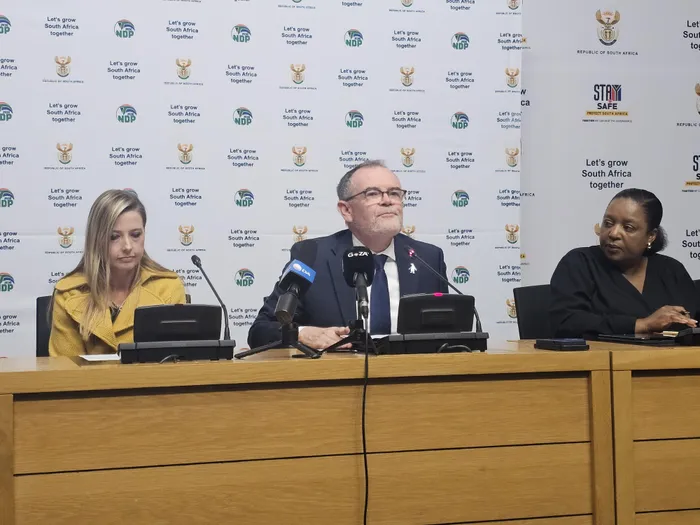
Heloise van Schalkwyk, Minister Dr Dion George and Dr Patience Gwaze from the Department of Forestry, Fisheries and the Environment at the media briefing.
Image: Theolin Tembo/Independent Newspapers
Minister of Forestry, Fisheries and the Environment, Dr Dion George, has announced the identification of 59 bankable biodiversity projects aimed to generate a minimum of $450 000 (just more than R8 million) in green finance, harnessing investments to bolster the biodiversity economy.
The initiatives, announced during the department’s budget vote speech in Parliament on Friday, come through the newly launched biodiversity sector investment portal, designed to connect potential investors with viable projects that enhance environmental sustainability.
This strategic approach aims to position the Department of Forestry, Fisheries and the Environment (DFFE) as a national leader in environmental financing amid ongoing budgetary constraints.
“In the face of budget cuts, the DFFE is doubling down on financial discipline and innovation to ensure every rand unlocks value for people and the environment,” George said.
To achieve these aims, each branch of the DFFE is encouraged to seek new revenue streams, reduce unnecessary expenditure, and secure sustainable financing.
The groundwork has begun on draft regulations aimed at unlocking the value of carbon credits, paving the way for monetising environmental assets within the department’s portfolio.
This strategy is anticipated to facilitate job creation, habitat conservation, and private-sector investment, alongside the financing of critical programmes.
The initiatives include the Green Fund, managed by the Development Bank of Southern Africa (DBSA), which continues to channel public funding into pioneering climate, energy, and waste projects.
The biodiversity investment portal has already spotlighted a total of 59 promising projects, with at least $450 000 in green finance firmly committed.
Moreover, George showcased the positive impact of various department entities in delivering environmental conservation and socio-economic growth.
The South African National Parks (SANParks), for instance, has emphasised inclusive development, having created over 21 000 full-time jobs through the Expanded Public Works Programme over the past five years.
Progress is also evident in the iSimangaliso Wetland Park Authority’s commercialisation strategy, resulting in 62 contracts being signed and new revenue from tourism concessionaires set to flow directly to the entity from September 2025.
Furthermore, the South African National Bioinformatics Institute (SANBI) is poised to lead with a $40 million Green Climate Fund project launching this year. This initiative is expected to benefit more than 350 000 people directly and 1.5 million indirectly through investments in ecosystem-based disaster risk reduction.
BUSINESS REPORT